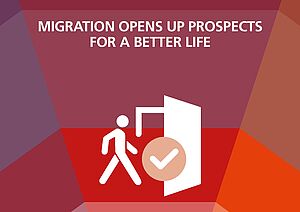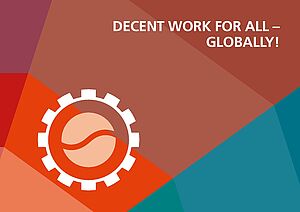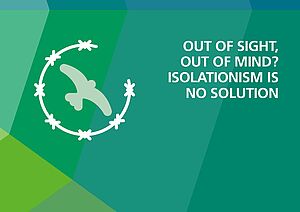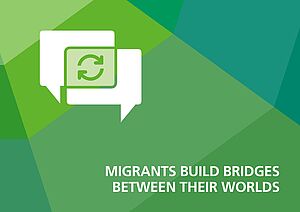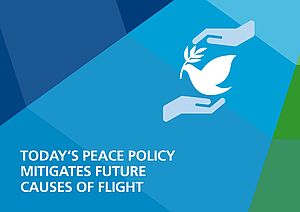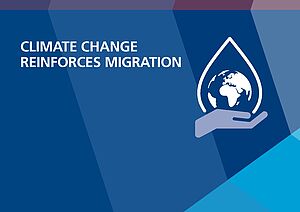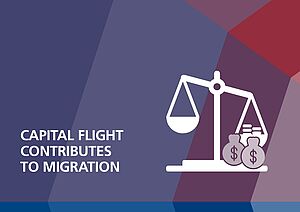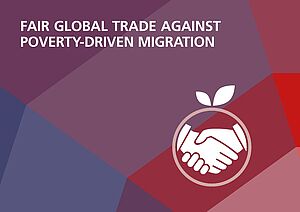Shaping migration – justly and globally!

People were, are and always will be in movement—for various reasons. Migration is therefore nothing new to human history, even though the mainstream media uproar in recent years might have led to this impression.
Migration should not be regarded as a problem, but foremost as a societal challenge that needs to be actively shaped and tackled in a just and global manner.
Migrant-rights organizations along with social movement allies from around the world rallied behind this message in Berlin where they convened from 3-4 July for the People’s Global Action on Migration, Development and Human Rights (PGA). At this global forum supported by Friedrich-Ebert-Stiftung, participants reflected on the state of migrant rights around the world, shared organizing experiences, and strategized for a collective platform at the global level as governments plan to negotiate a Global Compact on Safe, Orderly and regular Migration in 2018.
The importance of shaping a just migration has been also underpinned by the United Nations in the Agenda2030, a global framework for development and cooperation that highlights also the rights of migrating persons. States and societies need to agree on universal principles, rules and political projects which will enable a better respect of these rights.
In a time that marks a turning point for migrant rights policies and migrant communities globally, FES launched a campaign to raise awareness of the global dimensions of migration and human mobility.
“Shaping migration – Justly and Globally” was first presented in German on the dedicated portal to questions of Flight, Migration, Integration early in July. The brainchild of the Division for International Cooperation of FES, this political project was shaped by a core project team that brought together perspectives from the work by FES in Sub-Saharan Africa, North Africa and the Middle East, Asia, Latin America and the Caribbean and Asia.
Preparations steered over the past six months by the project team included consultation with FES program officers, scholars and politicians. The collective undertaking led to the formulation of ten poignant messages intended to stir debate for shaping global governance on migration in a just way.
“We seek to change individual perception on migration by demonstrating how migration in an era of globalization is connected to a wide range of global issue,” explained Felix Braunsdorf from the Department on Global Policy and Development at FES in Berlin and member of the core project team, together with Elisabeth Braune, Ingrid Ross, Friederike Stolleis and Benjamin Reichenbach.
Supported by a youtube video and a brochure, the ten messages are also available as postcards for wide distribution.
Take a look at the ten messages, and become part of the awareness raising campaign for shaping migration justly and globally by following four simple steps:
- 1. Download the postcard files
- 2. Print the front and back of the postcard on your home or office printer
- 3. Glue the front and back part of the postcards together
- 4. Affix a stamp and mail to a friend
MIGRATION OPENS UP PROSPECTS FOR A BETTER LIFE
A simpler, more transparent immigration policy not only relieves the strain on the asylum system—it can also spare migrants dangerous journeys and long waits. Such a policy implements clear regulations and dries up human traffickers‘ and smugglers‘ source of business. Policies governing immigration must take into account the rights of migrants, demographic challenges and factors characterising labour markets in countries of origin and destination.
Download and print the postcard here
DECENT WORK FOR ALL – GLOBALLY!
Many people leave their homes in search of a life in dignity and security. Better working conditions and social security throughout the world would reduce the pressure to leave one‘s home in search of a better life. Migrants are particularly at risk of being exposed to exploitation—including in Germany. Combatting the shadow economy and reducing temporary and agency work helps all workers.
Download and print the postcard here
HAVING A SAY WHEREVER YOU LIVE
Many people seek peace, democracy and freedom and also leave their homes for this reason. In the country that they migrate to, however, they often do not have any political voice. Integration will never succeed on this basis. When persons immigrate in an orderly procedure and settle down for a longer period, they must be able to take part in political life, for example in local elections and referendums.
Download and print the postcard here
OUT OF SIGHT, OUT OF MIND? ISOLATIONISM IS NO SOLUTION
Building walls along borders and interning migrants causes many people to die travelling along dangerous routes or endure harsh, inhuman conditions in camps. Orderly escape and migration routes reduce the risks and costs people have to bear, easing the way to a new beginning. Resettlement programmes to protect refugees also make good sense—for instance resettlement in third countries—as does the granting of humanitarian visas by embassies and consulates.
Download and print the postcard here
MIGRANTS BUILD BRIDGES BETWEEN THEIR WORLDS
Migrants contribute to the development of their new and old home countries. The aid they send to relatives is targeted, reliable and exceeds the amount of development aid. If migrants have a positive experience with democracy, freedom of opinion and equal rights, this can influence the society they come from. The positive effects are greatest when people are able to travel back and forth. That is why transparent, flexible regulations for labour migration make sense.
Download and print the postcard here
SCHOOLS AND ROADS INSTEAD OF WALLS AND FENCES!
Development funds are increasingly being spent to prevent migration. But border fences and restrictions on the freedom of movement hinder economic development while criminalising migration. Development cooperation should foster self-responsibility instead of making migration controls obligatory. Funds should not be invested in walls and fences, but rather in education, health and infrastructure.
Download and print the postcard here
TODAY‘S PEACE POLICY MITIGATES FUTURE CAUSES OF FLIGHT
Arms exports to countries with dubious regimes damage the credibility of Germany‘s and Europe‘s foreign and development policy. Instead of arming other countries so that they can upgrade up migration controls, dialogue, diplomacy and prevention must be at the heart of an active peace policy, and parties to conflicts must be brought to the negotiating table early on. An active peace policy includes strengthening rule of law, democracy and division of powers.
Download and print the postcard here
CLIMATE CHANGE REINFORCES MIGRATION
Climate change is irreversible. Rising sea levels and expanding deserts are destroying the foundations of people‘s lives. To survive, many have to leave their homes. For many people, migration is not what they want, but rather their last resort. Climate change exacerbates already-existing problems, such as clashes over resources or lower yields in agriculture. An ambitious climate policy can therefore also mitigate the causes of flight.
Download and print the postcard here
CAPITAL FLIGHT CONTRIBUTES TO MIGRATION
The unequal distribution of wealth between North and South as well as within countries is a driving force in migration. Multinational enterprises are very good at avoiding taxes—thereby robbing poor countries of crucial resources. In order to bring about social justice, effective taxation systems have to be established in developing countries and international tax competition and tax avoidance combatted, e.g. by means of a global tax register.
Download and print the postcard here
FAIR GLOBAL TRADE AGAINST POVERTY-DRIVEN MIGRATION
The world economy is one reason why people have to leave their homes in the face of poverty and hunger. Only fair global trade establishes and maintains the basis of people‘s life. Agriculture in the developing countries, for example, needs to be protected against cheap vegetables and meat from multinational food corporations. Human rights, labour rights and environmental protection must have priority over the interests of multinational enterprises.
Download and print the postcard here
